2022 Yamaha XSR900 Review - First Ride
The sportiest Sport Heritage
Some of us were a bit surprised when Yamaha’s newly overhauled 2021 MT-09 snagged first place in last summer’s 900cc(ish) Naked Bike Comparison, against such more-expensive heavy hitters as the new Ducati Monster and KTM Duke 890. And all of us were a little surprised when the XSR900 defeated Indian FTRs 1200 and 1200S, and the now-defunct Monster 1200S, in an only slightly unfair 2019 comparo. (Slightly unfair because our test route was really nothing but tight, twisty roads.) Now, the 2022 XSR900 is newly overhauled just as last year’s MT-09 was, using all the same parts from the waist down, including the new super-sized 890 cc version of that most excellent CP3 three-cylinder and all its electronic controls.
2022 Yamaha XSR900
Editor Score: 90.0%
| Engine | 19/20 | Suspension | 13/15 | Transmission | 9.5/10 |
| Brakes | 9.25/10 | Instruments | 4.25/5 | Ergonomics | 8/10 |
| Appearance | 8.5/10 | Desirability | 9.5/10 | Value | 9/10 |
+ Highs
- A lot of practical, high-po moto for the money, including cruise control and quickshifter
- Looks like it costs more
- ’Bout time Christian Sarron gets some love
– Sighs
- You’ll miss the MT-09’s seat after about an hour
- Crying out for color-matched tail cowl
- A little mini-fairing wouldn’t kill it either
From the waist up, even a rudimentary eyeballing reveals things are completely different. What’s going on, says Yamaha, is an homage to its iconic old GP racers of the ‘80s, the blue one here in particular representing “a modern take on the classic French Sonauto Yamaha race colors — the stunning blue, cyan and yellow combination famously campaigned by legendary French Grand Prix champion Christian Sarron.”
You can see it in the big, flat-top 3.7 gas tank (the rear chunk is steel), in the little gap between tank and seat, in the Dzus fasteners that hold the sidepanels on and the tucked-under taillight. But mostly that ‘80s GP connection is trying to be conveyed by the shape of the seat, the rear section of it in particular. Nobody at Yamaha USA claims to know why there’s not a plastic cover to match the tank either already on the bike or at least in the accessories catalog?
Homage or not, it only makes sense to offer a more classically styled, round-headlight version of the CP3 for the crowd who don’t like the MT’s more contemporary styling.
The racy connection of the new XSR also takes the form of firmer suspension settings and more aggressive ergonomics than sistership MT-09. Compared to the MT, your grips are 14mm forward and 35mm lower, while your rear end is moved back a bit and 22mm lower (on a 22 mm lower seat); your feet are in just about the same natural place. The bars and the pegs are a little bit adjustable.
That 0.8-inch lower seat sits upon a new steel subframe (better for customization than aluminum), which rides upon a new swingarm that’s 59mm longer than the MT’s unit. Though MT and XSR both have the same rake and trail numbers, 25 degrees and 4.3 inches, the XSR wheelbase is 2.6 in. longer.
2021 Yamaha MT-09 Review – First Ride
Add all that up, and what you’ve got is a longer, lower, firmer-sprung motorcycle: Think of the MT-09 more as an urban “streetfighter,” and the XSR as a more serious backroad sportbike. Yamaha says it’s “the highest performing platform ever for a Yamaha sport heritage machine.”
I suppose one of us will have to ride it
It fell to yours truly to once again ride the Pacific Surfliner to Ventura, there to hop onto a brand-new XSR the next morning for another assault on one of California’s finest fast curvy roads, Highway 33, over the Topatopa Mountains. (I never knew they were called that until I was quaffing a Topa Topa Chief Peak IPA later that evening.)
Now, we’ve got all the IMU-assisted electronics just like the new MT last year, with four ride modes, a full ride-by-wire throttle, and up/down quickshifter as standard equippage. It’s 22mm easier to swing your leg over the seat, the ergos only feel a smidge racier at first sit, the exhaust bark is subdued but definitely eager, and all systems are go.
It was chilly/drizzly in that morning coastal fog, and you wonder why a Christian Sarron-inspired mini-fairing isn’t part of the package? On the bumps, you can sense that our fork springs (in the same 41mm KYB unit as the MT) are 7% stiffer than the MT ones, and that our KYB shock’s rear spring is 21% stiffer: That’s to deal with the increased leverage of the 2.3-inch longer swingarm.
On smooth pavement, which is what Highway 33 is with its recent repave, it’s delicious – a smooth-rolling low-flying stable thing that’s neither light nor heavy-steering, but right in the sweet spot. Those new golden “spinforged” wheels look way too nice to be on a $9,999 motorcycle, and Yamaha says they reduce rotational mass by 11% (24.7 ounces lighter per wheelset). Bridgestone S22 tires are, likewise, not shabby. There’s no steering damper, and the bike feels like it never needs one, feeding back nicely planted messages from both ends.
Though suspension travel is the same as the MT, there’s less fore/aft pitching thanks to the stiffer springs, increased compression damping, and reduced rebound damping at both ends; it’s a vicious circle that has you twisting the throttle harder and squeezing the brakes more as you wind in and out of the corners, wondering how much is your amazing raw talent and how much is the bike’s IMU?
We’ve had a stroke
Now at a full 890cc following its 3mm stroke job, the Yamaha Triple is one of the finest engines on the road, mainly because its torque-rich yet revvable nature means it does its best work below 120 mph or so – a speed it’s easy enough to achieve on some of Hiway 33’s straights. If you need more than that, have a look at the MT-10. And please confine yourself to track days.
The MT-09 we dynoed last year made 106 horses at 9900 rpm, and 63 lb-ft torque at 7000. Our scales had that same MT at 416 pounds with 3.7 gallons of fuel; Yamaha says the XSR is 8 lbs heavier. Which is still nice and light.
Anyhow, the same quickshifter the MT got last year has found a home on the XSR, which already had a great gearbox, and now, it’s even easier to bip up and down through it, sometimes accompanied by a nice little backfire yelp on the overrun to complement the Triple’s excellent exhaust music on the way up the digital tachometer. Blipping and brapping between 2nd, 3rd, and 4th reels in Hiway 33’s best sections just right, at speeds that fit the bike’s lean-into it ergos perfectly on a warm day. When you do need the clutch, the lever is nice and light, and its slip function makes those smooth downshifts even smoother.
Just like the MT, you’ve got four easily selected Drive modes, 1 being sharpest and 4 reducing power (rain mode). I only used 1 and 2, where power take-up is nice, smooth and linear.
There’re plenty of other adjustments in the 3.5-in TFT display also, including BC brake control (you can swap between ABS and lean-sensitive ABS for some reason), QS (turn the quickshifter Off, or just off in either the up or down direction)… There’s also wheelie control, traction control, and slide control – all stuff lifted from the R1. People who are good at wheelies, were good at wheelies on the XSR.
At the end of the road, it’s pretty much just as Yamaha claims: It feels like on a fast road like 33, or a racetrack, the longer, lower, stiffer XSR would ease away from an equal rider on an MT (and plenty of riders on anything). Then again, on tight, bumpy backroads, the softer, shorter-wheelbased, more ergonomically upright MT could probably turn the tables.
After lunch, we did turn the rear preload ramp up a notch and increased rebound a click, and the XSR was turning even sharper and feelier.
The 101 Freeway
And on the morning after my ride up the 33, it was time to ride the XSR 110 miles home down the freeway. It was chilly and foggy again along the coast, and again, I dreamed of a nice little fairing, but by the time I got to The Valley it was hot and I was glad not to have one. By the time I got home, 96 minutes later, I was also dreaming of the MT-09’s plush, wide seat. As befits its sportier status, the XSR gets a pad that’s narrower, thinner, and square of edge.
It didn’t help that I didn’t take the time to return the shock preload to its standard, softer position rolling through Ventura’s bumpy surface streets and over a few sections of aptly named Superslab, where the bike drove home in a fundamental way how serious Yamaha is in calling it the highest performing platform ever for a Yamaha sport heritage machine. You can have sporty and you can have plush, but on a sub-$10k motorcycle it’s tough to have both.
What made the sporty ride completely bearable, though, was the cruise control button on the left switchgear. Whenever there’s a gap in traffic, switching that baby on makes it easy to give your right side a break. And when the cars are flowing at a decent speed, it makes it easier to flow along with them instead of acting like Rich Strike trying to bite the other horses even after he’d already won the Kentucky Derby. Just chill.
Five-thousand rpm gets you 75 mph in sixth gear and a bit of tingle in the handlebars. Dialing it up to 80-ish smoothed my XSR out nicely, and that slight forward cant compared to the MT has you pretty neutral in the windblast, too. At a steady 85-ish, we also got 50 mpg. Not bad.
Small things
You can lock the fork either full left or full right, a thing I don’t remember seeing before, but that’s kind of thoughtful for some reason I can’t quite put my finger on. We’ve got all LED lighting, including the skinny turn signals and tucked-under the tail taillight. The aluminum tray under the tail section is nice. So are the forged aluminum foot controls and swing-out passenger pegs.
Faster sons
It’s the design philosophy behind Yamaha’s “Sports Heritage” line, showing respect for its rich racing heritage while using stripped-down design, high technology, and modern electronics to keep things future-focussed. Meanwhile, on the Dark Side of Japan, there’s the MT-09. The XSR is a bit racier, the MT’s a bit more playful. They’re both maybe the most fun you can have on a sub-$10k motorcycle in the real world, in addition to being practical transportation. Kind of depends on where you ride and how fast. And speaking of Faster Sons, might we just close with, Go Fabio!
In Gear
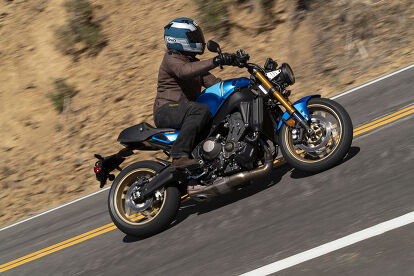
Helmet: Arai Regent X Bend
- Jacket: Dainese Street Rider (discontinued)
- Jeans: Trilobite Parado
- Gloves: Dainese 4-Stroke 2
Boots: TCX Fuel WP
2022 Yamaha XSR900 Specifications | |
|---|---|
| MSRP | $9,999 |
| Engine Type | 890cc liquid-cooled inline-three cylinder, DOHC, four valves per cylinder |
| Bore and Stroke | 78.0mm x 62.1mm |
| Compression Ratio | 11.5:1 |
| Horsepower | 105.8 @ 9900 rpm (rear-wheel dyno, 2021 MT-09) |
| Torque | 62.8 lb-ft @ 7000 rpm (rear-wheel dyno, 2021 MT-09) |
| Transmission | 6-speed; slip-assist clutch; up/down quickshifter |
| Final Drive | Chain |
| Front Suspension | 41mm inverted KYB fork; adjustable for spring preload, rebound damping, compression damping, 5.1-inch travel |
| Rear Suspension | Single shock; adjustable for spring preload and rebound damping, 5.4-in travel |
| Front Brake | Two 298mm discs, radial-mount four-piston calipers, lean-sensitive ABS |
| Rear Brake | 245mm disc, lean-sensitive ABS |
| Front Tire | 120/70-R17 |
| Rear Tire | 180/55-R17 |
| Rake/Trail | 25 deg/4.3 in. |
| Wheelbase | 56.3 in. |
| Seat Height | 31.9 in. |
| Curb Weight (Claimed) | 425 lbs. |
| Fuel Capacity | 3.7 gal. |
| Colors | Legend Blue, Raven Black |
| Warranty | One year limited warranty |
We are committed to finding, researching, and recommending the best products. We earn commissions from purchases you make using the retail links in our product reviews. Learn more about how this works.
Become a Motorcycle.com insider. Get the latest motorcycle news first by subscribing to our newsletter here.
More by John Burns



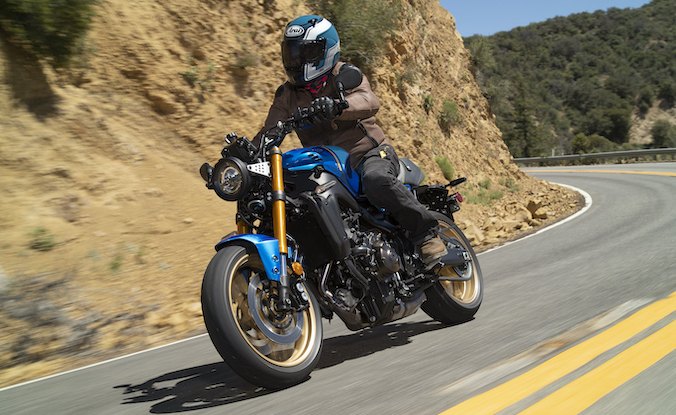











































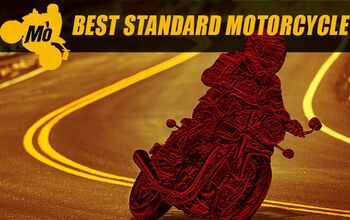
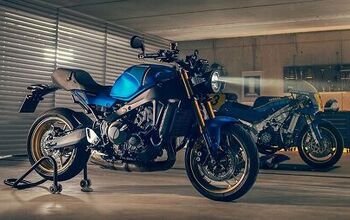
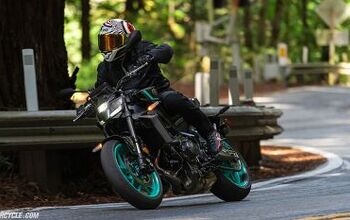

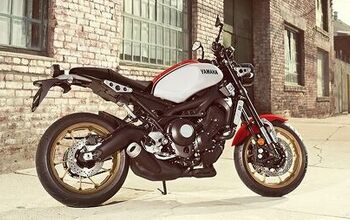
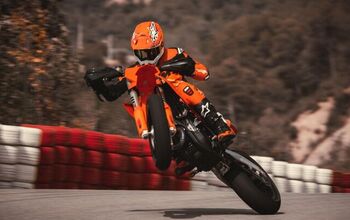
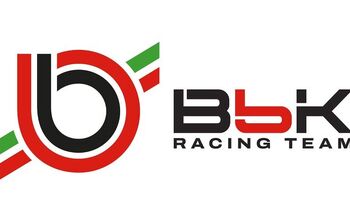

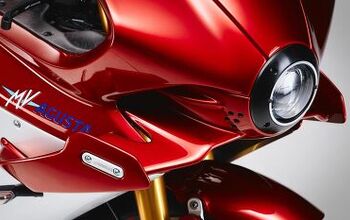

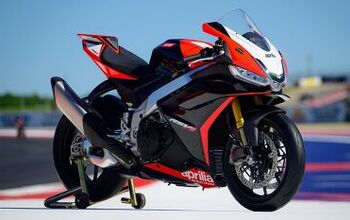


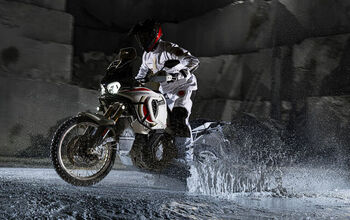
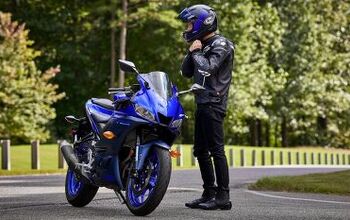
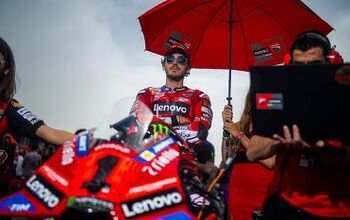

Comments
Join the conversation
Lose the headlight and ears as well as the seat....might look good after.
Ordered a 2024 Heritage White. Can’t wait!